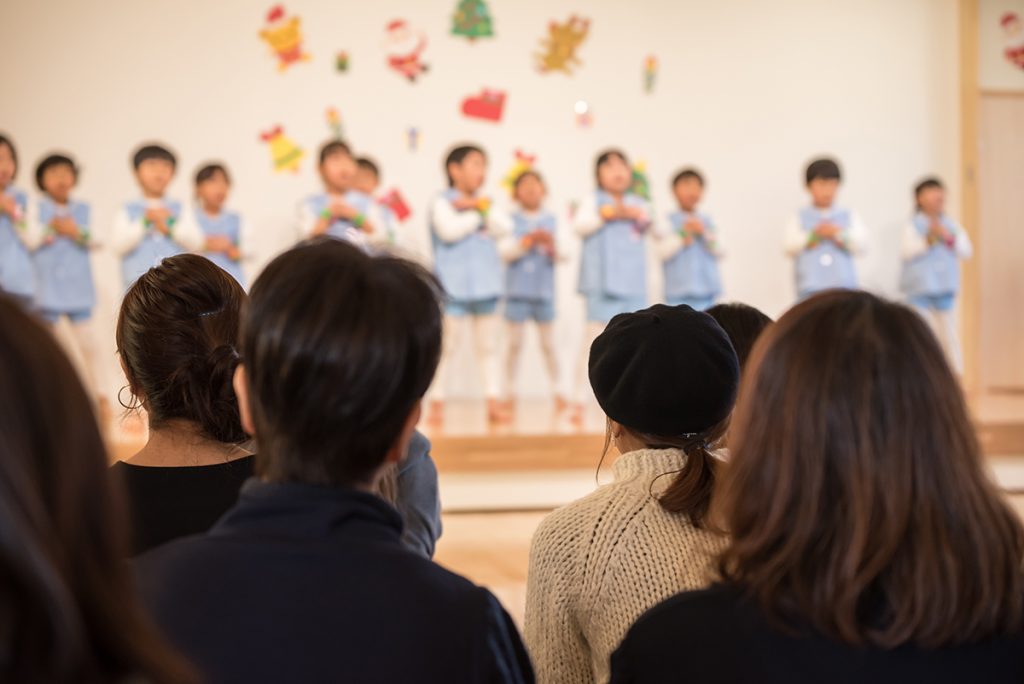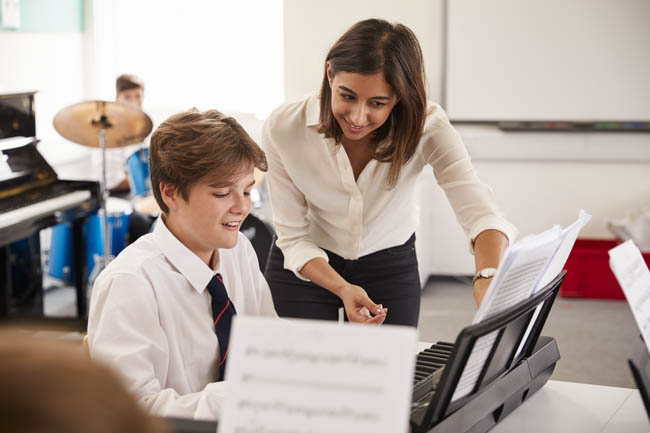How To Stay Organized And Pull Off Successful Music Recitals

Planning Music Recitals: The Rundown
Planning music recitals is a special endeavor because they give students a chance to see how far they’ve come. Students take all the knowledge that they’ve learned throughout their time at your music school and they apply it to a performance that they share with an audience. Some might say that due to the nature of the audience, typically full of the family and friends of the student, the teacher has just as big of a moment as the performers.
One big thing to remember is that recitals are not just for students: parents and other family members get to see the efforts of their relative pay off and you get to see your teaching skills be put to the ultimate test. Also, family members are probably just as anxious about the performance as the student and the teacher are. Overall, it’s a big deal and it’s a big night, and everyone who has a hand in pulling it off ought to be celebrated.
Recitals are not just for students: parents and other family members get to see the efforts of their relative pay off and you get to see your teaching skills be put to the ultimate test.
As wonderful as recitals are, they take a lot of work. Planning music recitals requires a team effort, on the part of the students, the teachers, and the parents. So, before we get into how you can stay organized and pull off a successful recital, let’s delve into why music schools should have recitals:
1. Music recitals encourage the growth of students
When someone dedicates themselves to the long-term process of learning an instrument, and all of the frustration and passion that comes with it, they will grow as a person. Making that commitment, knowing that there will be good days and bad days and life will sometimes get in the way, helps people grow.
What you as a music teacher want in a student is emotional integrity: you want them to be honest about the process, whether they’re having an easy or difficult time, and you want them to become better people because of it. Recitals are goals that students work towards that encourage discipline, and that’s what helps them grow as people.

2. Music recitals teach students time management
It’s clear that without practice, you won’t see any improvement in whatever instrument you’re studying. However, making time to study takes commitment and good time management skills in order to juggle music practice on top of everything else your students have going on in their lives. And when they have a recital breathing down their neck’s, you better believe that they will make the time to practice, so that their performance will be perfect.
3. Music recitals provide a reachable goal to work towards
Remember when you had a goal to become a music teacher or open your own music school? Perhaps you saved money towards that goal or, to become a teacher, you took extra lessons. You hustled, built, and developed your character. When a student knows that they’re going to perform on a certain date, and they understand that the culmination of their efforts is dependent on practice, it teaches them that they get what they give. Most things worth having don’t come easy, and you have to work hard and keep at it to see the results that you want to see. The process of preparing for a recital teaches your students that very valuable lesson.

4. Music recitals help students overcome possible fears of being in public and performing for an audience
Performing in public is not easy, and everyone has some level of worry or anxiety about performing for an audience. Stage fright is real: people, for the most part, want to be accepted and they want their efforts and themselves to be well received. So imagine taking on a passion like music and then sharing it with the world. It takes a lot of guts to do that. But everyone has it within them to face their fears, and being part of a music recital helps them overcome those fears. It builds self-confidence and self-acceptance, and it teaches music students that they should always tackle fears head-on to come out on top of them.
5. Music recitals bring about teachable moments
So what if your student fumbles up a song on the piano or the guitar? And so what if, when singing, they forget the lyrics? That’s the point: making mistakes builds character. Part of life is making a mistake, experiencing that fall, and getting back up again. It’s about the lessons you learn about yourself and the mistakes you’ve made that help you chart your path in life. So, if you’re nervous about your student performing in front of an audience because you think they might mess it up, realize that it’s OK if they do.
So, if you’re nervous about your student performing in front of an audience because you think they might mess it up, realize that it’s OK if they do.
There are many more reasons why music recitals benefit the student and many more reasons why they benefit the teacher and parents too! Now I want to get into how to plan an amazing music recital for your students and their family members. So, still with me? Good!
Because recitals take a lot of time and effort, most music teachers, independent or not, only do them a couple of times a year. But as we have established how important they are for students, we also know that they should happen as often as possible. So let’s talk about how you can make the process of planning a music recital as smooth and as organized as possible for you and your students.
It’s a process:
There are steps that a music teacher must take in order to stay organized and pull off a successful music recital. Here are the steps that you should take to have a good recital that doesn’t stress you out too much:
1. Have a game plan and start planning early
Music recitals can be stressful because they require a lot of time, effort and dedication, before, during, and after the recital. You need a game plan for these events in order for them to be successful. You couldn’t just decide that you want to do a recital today and put it on tomorrow, could you? Of course, you have to have a game plan and you have to start planning early.
Recitals must be put together months in advance because of all the moving parts involved. Teachers and student have to agree to certain songs; students have to make time to practice with their teacher and at home; and, if your students are younger, parents have to make time to take their kids to practice and encourage them to practice at home.
Because it does take time, it’s important to put up music selections as early as possible. Ideally, some months in advance, so students can prepare for the song or songs that are right for them. This is vital because if for any reason, one or more of your students don’t feel comfortable doing the song that they initially agreed to, you’ll still have time to help them pick another song.
2. Manage your time well
Once you’ve established that you want to do a recital, and you’ve given your students options so that they pick a song that showcases their strengths as a musician, it’s important to manage your time well.
As a teacher, and perhaps as a music school owner, you are obviously being pulled from every direction and you’re likely up to your ears with commitments. Maybe you have several students who need your time and you have other responsibilities aside from being a music teacher. Don’t fret: it’s extremely important to set your teaching hours very clearly and stick to it. Not only does it take the stress off you, it also teaches your students how to respect your time.
Don’t fret: it’s extremely important to set your teaching hours very clearly and stick to it. Not only does it take the stress off you, it also teaches your students how to respect your time.
Many teachers take on last-minute visits to help their students, and that’s great, but there are only so many hours in a day. If you know you have a lot to do, then make sure you budget your time effectively so you aren’t left feeling overworked and unmotivated.

3. Give your students a voice
To put it simply, students need to pick their own songs for their recital. It’s their performance and they have to own it. If you’re a teacher who wants to have more control, then you ought to give them a selection of songs that they can choose from. This will give you the creative and thematic control that you are after while giving your student a sense of a personal stake in something that they are a major part of. The benefits of allowing your students to pick are:
- Students automatically feel more of an obligation and responsibility for something that they’ve taken on themselves.
- Students will also feel more connected to a piece they’ve selected because they chose the one that they were drawn to.
- Students will be more excited to learn a song that they picked. And, consequently, they put more effort into the process of learning the song, and your recital will turn out to be more of a success.
4. Stay organized
Planning a music recital requires detailed event management. Consider:
- How many guests can attend?
- Will guests pay for their tickets? How much?
- How will guests purchase or reserve their tickets? How will you make them available online?
- Should you offer an early-bird ticket sale price versus a last-minute buy price?
The right music school management system makes all these details much easier to stay on top of. With WellnessLiving’s all-in-one music school software, use the event management tool to access simple, intuitive planning features that give you complete control to customize every recital. Configure pricing, taxes, capacity and more with ease. You can even set automated marketing campaigns to keep your clients in the loop on upcoming events and ticket pricing deadlines.
Using a management software like WellnessLiving will take the burden of administrative planning off your shoulders, so you can focus on preparing your students.
With WellnessLiving, you can build an event to be whatever you need it to be. Did you want to limit the number of seats? No problem! Want your guests to only order tickets in person? Put it in your event requirements! Need your clients to pre-register or book before they show up to your recital? Done!
Does your current music school software offer event planning tools? Using a music school software like WellnessLiving will take the burden of administrative planning off your shoulders, so you can focus on preparing your students.
5. Ensure that your students are well prepared
Be frank and honest with your students about what it takes to put on a successful music recital, and tell them how important their role in the recital is. To be forewarned is to be forearmed: when you tell them how vital it is for them to practice and give it their all, chances are they will be more likely to practice and practice hard.
Hold them accountable: although we don’t want to freak out your students by reading them the riot act or making them feel like they’re not trying, it is important to get a sense of their process away from your music school. So ask them the following questions (taking care to ask them as gently as possible):
- How often do you practice? And for how long?
- Do you feel confident and prepared to perform in front of an audience?
- Is there anything, regarding the pieces that you are performing, that I can help you with
- What does this recital mean to you?
6. Keep parents informed
It is so important to keep your students’ parents informed throughout the entire process of recital planning. Circulating periodic reminders via email, or sending students home with letters for their parents is vital because it gives parents an understanding of you and your student’s process.
Closer to the day of the recital, you can give more personalized updates, such as seat numbers, directions to the recital venue, the time and date of the recital, the songs that they’re playing, student and venue dress code, and everything else you have going on.
7. Encourage your music students to socialize with other students after practice
Sometimes all it takes to bolster your confidence and feel like you’re not alone in the recital practice process is having other people who share your passion for music to trade stories with. You ought to encourage your students to spend time with each other away from the school and away from anything musical so that they can unwind and do other things that make them happy.
Recitals can sometimes suck the life out of students, and take away their joy of music, so it’s necessary that you as their teacher do everything that you can to keep the love of music alive.
And beyond encouraging students to hang out with each other, you can also take your students away from music for an hour or two to do some other activity. You could take your students bowling, mini-putting, out to a movie…the possibilities are endless! Simply reach out to your students’ parents, and ask them if it’s OK for you to take your students out to have some fun in town.
Why should you take them out to unwind? You should take your students out for fun to remind them that, although the music recital is important it’s not the beginning and end of life. Your students joined your music class because music is likely their passion. So, why not remind them that, while music is important, maintaining a work-life balance is vital.
It All Comes Down To…
Planning a music recital is a lot of work, but it doesn’t have to feel next to impossible. With the right planning and mutual agreements from students, parents, and you to come together, it can be an amazing success.
With the help of WellnessLiving’s all-in-one software management solution, your recital will be an organized and successful undertaking. From automated marketing campaigns to staff and student schedule management, our music school software has everything to help boost your business!
Ready to stand out with the right music school software? Book a free, no-commitment demo today!






